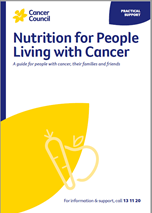- Home
- Cancer Information
- Living well
- Nutrition and cancer
- Treatment side effects and nutrition
- Other types of bowel irritation
Other types of bowel irritation
Some chemotherapy drugs, stem cell transplants and radiation therapy to the pelvic area can make the bowel swollen and sore. This is called colitis when it affects the colon (the large bowel), and proctitis when it affects only the rectum (the last part of the bowel before the anus). You may feel the need to empty your bowels often, perhaps without much result. Straining can cause discomfort, and there may be blood or mucus in your bowel movements. Diarrhoea, nausea and vomiting are also common, but can be managed with medicines.
The small bowel may become irritated after chemotherapy or radiation therapy to the abdomen or pelvic area. This is known as enteritis and it can cause discomfort in the abdomen (like cramps or wind pain), pale and runny bowel movements, and more wind than usual.
How to manage bowel irritation
- Eat and drink slowly, take small mouthfuls and chew your food well to avoid swallowing air.
- Have foods low in insoluble fibre to reduce bowel irritation in the short term. Include foods high in soluble fibre to “soak up” additional liquid in your bowel.
- Avoid fatty, spicy or fried foods, and rich gravies and sauces.
- Reduce foods such as corn, beans, cabbage, onions, pickles and fizzy drinks, which can produce wind.
- Drink plenty of water, and eat soft or cooked peeled fruit, fine wholemeal bread and bran to provide soft bulk. You may be encouraged to take an oral rehydration solution, such as Hydralyte or Gastrolyte, to keep hydrated.
- Do some gentle exercise, such as walking, to encourage more regular bowel movements.
- Tell your doctor if symptoms don’t improve. Bowel irritation is usually temporary, with colitis and proctitis lasting up to 8 weeks and enteritis lasting 1–2 weeks after treatment ends.
→ READ MORE: Managing weight loss
Podcast for people affected by cancer
Listen now
Jacqueline Baker, Senior Oncology Dietitian, Chris O’Brien Lifehouse, NSW; Lauren Atkins, Advanced Accredited Practising Dietitian, OnCore Nutrition, VIC; Dr Tsien Fua, Head and Neck Radiation Oncology Specialist, Peter MacCallum Cancer Centre, VIC; Rosemerry Hodgkin, 13 11 20 Consultant, Cancer Council WA; Clare Hughes, Manager, Nutrition Unit, Cancer Council NSW; John Spurr, Consumer; Emma Vale, Senior Dietitian, GenesisCare, SA; David Wood, Consumer.
View the Cancer Council NSW editorial policy.
View all publications or call 13 11 20 for free printed copies.
Need to talk?
Support services
Exercise and cancer
Exercise has many benefits both during and after cancer treatment, helping with side effects, speeding up recovery, and improving quality of life
Looking for transport, accommodation or home help?
Practical advice and support during and after treatment
Cancer information
Relaxation and meditation
Learn how relaxation and meditation can help you both during and after cancer treatment, or listen to our relaxation and meditation podcast
Cancer treatment
Learn about the different treatments that are used to treat cancer, such as surgery, chemotherapy, radiation therapy and targeted therapy
